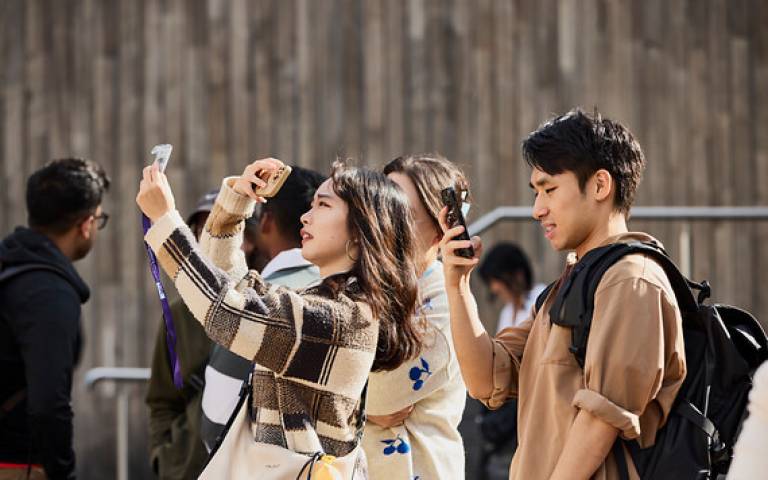Filmmaking as part of a module assessment
On the BA Education Studies, Rebecca Wilson (Digital Education) and Dr Sara Hawley (IOE) assessed students' learning through their planning, teamwork and personal reflection in filmmaking.

6 December 2023
As part of their module assessment, groups of students collaborated to produce a written and storyboarded production proposal. In these groups they made short films which were shown at the British Film Institute. Students also wrote an individual reflective essay on their process and experience of filmmaking.
Rebecca ran co-designed practical workshops, focusing on film planning, shooting, and editing skills needed to produce their final short film. Dr Hawley lead the theoretical lectures and introduced expert guest speakers.
Learning aims
The overall aim of the Media Education in Schools module was for students to harness film as an educational tool. More explicit aims included:
- To understand the relationship between media education, media literacy, media production and new technologies
- To enable students to describe the significance of media production for supporting creative and critical capacities, and for developing new pedagogies
- To develop students’ skills in moving image production and software.
Why filmmaking?
Making a short film offers students a meaningful opportunity for collaborative learning and group work in any discipline.
On this module the focus was on dramatic storytelling and the creative re-imagining of literacy. However, the length, content and genre of the film could be adapted to a range of subjects or disciplines, incorporating dialogue or documentary genre (e.g. poetic, expository, observational, or participatory).
‘The moving image is an 'ambient mode', one that people use and engage with without realising; the benefit of this module is that it sensitises learners to the distinctive language and meaning making possibilities offered by the moving image.' Mark Reid (Head of Education British Film Institute)
Group work and individual reflection
Students’ learning was assessed through a combination of structured planning, group work and personal reflection.
The assessment task for this module was an unusual one for students. It needed to be explained and reinforced during the module as clearly as possible. We also gave opportunities for anonymous questions via Mentimeter and face to face discussion, so we were confident that students understood what they needed to do.
Group work can often be challenging for students. We explicitly outlined the skills needed for group work and asked students to engage with a skills builder universal framework. This framework could be referred to throughout the module to resolve any group working issues that might arise.
Constraints can help creativity
We set the students clear parameters for the film content and length. The overall theme was ‘the Hunt’ but within that we included specific requirements including:
- a flashback
- filming night and day
- a foot/shoe close-up shot
- 80% outside domestic setting
- use of London (river, museums, galleries)
- transport or movement
- shots of weather
- elements of emotion
- and no dialogue.
Encourage students to focus on the process, rather than the product
We designed this filmmaking task to be achievable in an educational setting rather than in a film studio. We advised that students should use ubiquitous, easily available equipment and software; they could film using their phones or the iPads that were made available to them.
It was important to keep the technology and software simple, as we wanted students to focus on the planning, ideas and reflections on the process.
We believe digital storytelling is an important skill for students across all disciplines, to explore and articulate their ideas. Short filmmaking offers a meaningful and practical assessment opportunity which can be amended to fit into a variety of assessment contexts.
We intend to keep running this module and refine our teaching and the assessment activity. It is a pleasure to see the students develop skills, gain confidence and learn how to realise their ideas in this creative context.
‘the workshop has given me a deeper appreciation for the creativity and technical skill involved in filmmaking, and I feel more confident in my ability to contribute to future film production projects.’ Ms Peiyi Ren (BA Education student on the module 2022)
Watch some of the films made on this module:
Further reading
Cannon, M., & Potter, J. (2019). Pedagogies of Production: Re-imagining Literacies for the Digital Age. In C. Hermansson & J. Zepernick (Eds.), The Palgrave Handbook of Children’s Film and Television (pp. 161–189). Palgrave Macmillan.
 Close
Close

